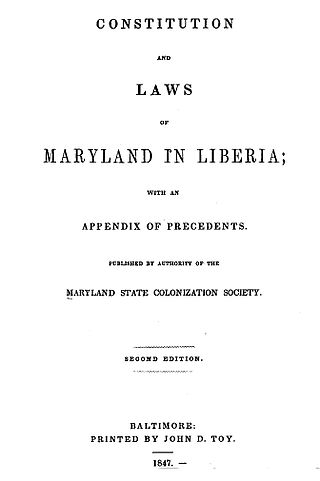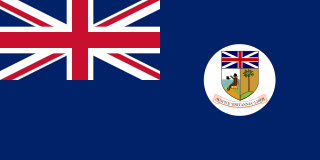Related Research Articles

Liberia is a country in West Africa founded by free people of color from the United States. The emigration of African Americans, both freeborn and recently emancipated, was funded and organized by the American Colonization Society (ACS). The mortality rate of these settlers was the highest among settlements reported with modern recordkeeping. Of the 4,571 emigrants who arrived in Liberia between 1820 and 1843, only 1,819 survived (39.8%).

Joseph Jenkins Roberts was an Americo-Liberian merchant who emigrated to Liberia in 1829, where he became a politician. Elected as the first (1848–1856) and seventh (1872–1876) president of Liberia after independence, he was the first man of African descent to govern the country, serving previously as governor from 1841 to 1848. He later returned to office following the 1871 Liberian coup d'état. Born free in Norfolk, Virginia, Roberts emigrated as a young man with his mother, siblings, wife, and child to the young West African colony. He opened a trading firm in Monrovia and later engaged in politics.

Maryland County is a county in the southeastern portion of Liberia. One of 15 counties that comprise the first-level of administrative division in the nation, it has two districts. Harper serves as the capital with the area of the county measuring 887 square miles (2,300 km2). As of the 2022 Census, it had a population of 172,202, making it the ninth most populous county in Liberia.

The Republic of Maryland was a country in West Africa that existed from 1834 to 1857, when it was merged into what is now Liberia. The area was first settled in 1834 by freed African-American slaves and freeborn African Americans primarily from the U.S. state of Maryland, under the auspices of the Maryland State Colonization Society.

Stephen Allen Benson was a Liberian politician who served as the second president of Liberia from 1856 to 1864. Prior to that, he served as the third vice president of Liberia from 1854 to 1856 under President Joseph Jenkins Roberts. Born in the United States, Benson was the first president to have lived in Liberia since childhood, having arrived with his family in 1822.

Since its independence from Portugal in 1975, Angola has had three constitutions. The first came into force in 1975 as an "interim" measure; the second was approved in a 1992 referendum, and the third one was instituted in 2010.
Black suffrage refers to black people's right to vote and has long been an issue in countries established under conditions of black minorities as well as, in some cases black majorities.
Hilary Teague, sometimes written as Hilary Teage, was a Liberian merchant, journalist, and politician in the early years of the West African nation of Liberia. A native of the state of Virginia in the United States, he was known for his oratory skills and was prominent in early Liberian colonial politics. A leading advocate for Liberian independence from the American Colonization Society, he drafted the Liberian Declaration of Independence in 1847, serving as both a senator and the first Secretary of State for the new nation in the years that followed.

The Maryland State Colonization Society was the Maryland branch of the American Colonization Society, an organization founded in 1816 with the purpose of returning free African Americans to what many Southerners considered greater freedom in Africa. The ACS helped to found the colony of Liberia in 1821–22, as a place for freedmen. The Maryland State Colonization Society was responsible for founding the Republic of Maryland in West Africa, a short lived independent state that in 1857 was annexed by Liberia. The goal of the society was "to be a remedy for slavery", such that "slavery would cease in the state by the full consent of those interested", but this end was never achieved, and it would take the outbreak of the Civil War to bring slavery to an end in Maryland.

Slavery in Maryland lasted over 200 years, from its beginnings in 1642 when the first Africans were brought as slaves to St. Mary's City, to its end after the Civil War. While Maryland developed similarly to neighboring Virginia, slavery declined in Maryland as an institution earlier, and it had the largest free black population by 1860 of any state. The early settlements and population centers of the province tended to cluster around the rivers and other waterways that empty into the Chesapeake Bay. Maryland planters cultivated tobacco as the chief commodity crop, as the market for cash crops was strong in Europe. Tobacco was labor-intensive in both cultivation and processing, and planters struggled to manage workers as tobacco prices declined in the late 17th century, even as farms became larger and more efficient. At first, indentured servants from England supplied much of the necessary labor but, as England's economy improved, fewer came to the colonies. Maryland colonists turned to importing indentured and enslaved Africans to satisfy the labor demand.

An independence referendum was held in the Comoros on 22 December 1974. The overall result was a strong "yes" vote, with 94.57% of voters voting for independence and almost all the "no" votes being cast in Mayotte, where there was a majority for remaining under French control. In contrast, on Mohéli only five out of 6,059 votes were against independence. Voter turnout was 93.3%.

An independence referendum was held in Liberia on 27 October 1846. The result was 52% in favor, with independence being declared on 26 July 1847.

A constitutional referendum was held in Liberia on 7 May 1935, alongside legislative elections. The changes to the constitution ensured that President Edwin Barclay remained in office without the need for the presidential elections due that year. Although it was claimed to be for economic reasons, the government feared that an election may lead to instability that would lower confidence of foreign powers and creditors. The next elections took place in 1939.

The Liberian Declaration of Independence is a document adopted by the Liberian Constitutional Convention on 26 July 1847, to announce that the Commonwealth of Liberia, a colony founded and controlled by the private American Colonization Society, was an independent state known as the Republic of Liberia.

A referendum on whether Antonio López de Santa Anna should remain President, and if not, who should replace him, was held in Mexico on 1 December 1854. The proposal was approved by 99.07% of voters. On 11 December Santa Anna ordered reprisal measures against those who had voted no; the ballot was not secret. On 2 January 1855 he declared that the country had confirmed his position in office. He was subsequently overthrown on 8 December that year.

A constitutional referendum was held in Anguilla on 6 February 1969. Following the 1967 uprising on the island, which had seen the local police force expelled, and a referendum on separation, British troops had taken over Anguilla, before leaving in January 1968. On 8 January 1969 Ronald Webster declared independence. A republican constitution was put forward and approved by 99.71% of voters. After the referendum, British troops returned to occupy the island on 19 March.
A constitutional referendum was held in Maryland Colony on 29 March 1854. The new constitution was approved by voters and general elections were subsequently held on 15 May, before independence was declared on 8 June.
A referendum on annexation by Liberia was held in the Republic of Maryland on 24 February 1857. All voters voted in favor, and an agreement with Liberia was signed on 28 February. On 6 April 1857 the Liberian Legislature accepted Maryland into the republic.

An independence referendum was held on Anjouan, an island in the Comoros, on 26 October 1997. Over 99% of voters voted in favour of independence. However, the vote was not recognised and the island returned to the control of the Comorian government in 2001.

The Colony and Protectorate of Sierra Leone was the British colonial administration in Sierra Leone from 1808 to 1961, part of the British Empire from the abolitionism era until the decolonisation era. The Crown colony, which included the area surrounding Freetown, was established in 1808. The protectorate was established in 1896 and included the interior of what is today known as Sierra Leone.
References
- 1 2 3 Maryland in Liberia (Liberia), 31 January 1853: Independence Direct Democracy (in German)
- ↑ The African repository, Volume 14, p42
- ↑ Maryland in Liberia (Liberia), 29 March 1854: Constitution Direct Democracy (in German)